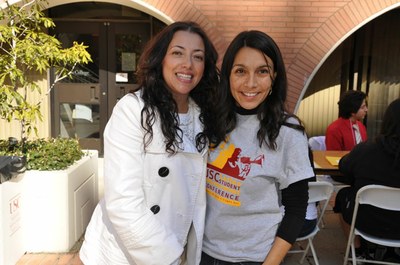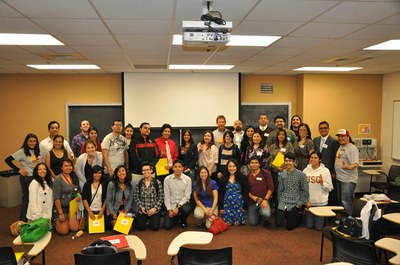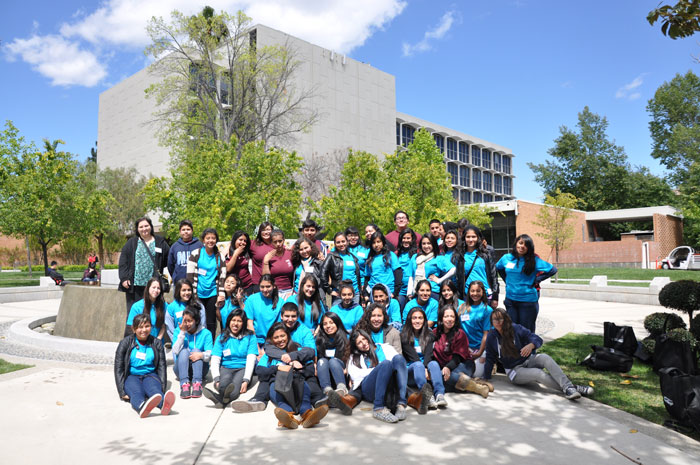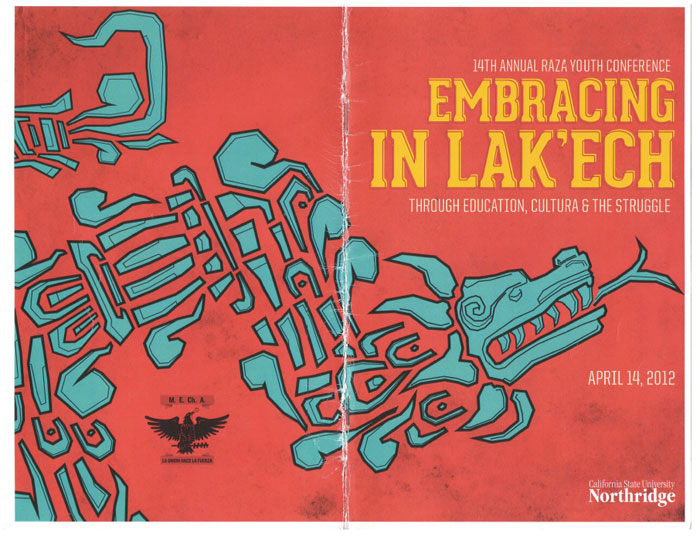College Partnerships
College Partnerships
CPSELs
6.1 Work with the governing board and district and local leaders to influence policies that benefit students and support the improvement of teaching and learning.
6.2 Influence and support public policies that ensure the equitable distribution of resources and support for all subgroups of students.
6.4 Generate support for the school by two-way communication with key decision-makers in the school community.
6.6 View oneself as a leader of a team and also as a member of a larger team.
6.7 Open the school to the public and welcome and facilitate constructive conversations about how to improve student learning and achievement.
Rationale
During the year 2010-2011 with the collaboration of teachers, counselors and administrators we founded a program called Fuerza Unida. One of the cornerstones of Fuerza Unida is to create a college going culture among the Latino population at Pali by supporting teachers, counselors and students in their work to increase the expectations of attending college by low-income, first-generation college-going students and their families. Fuerza Unida provides students with an opportunity to think of themselves as future college students by creating college partnerships.
USC
 As part of this goal and as a Madrina (Godmother) of Fuerza Unida, this year I was able to work with Veronica Terriquez a USC professor, published author and community organizer on school reform and other grassroots campaigns. Her research focuses on educational inequality, immigrant integration, and organized labor. Her work is linked to education justice and immigrant rights organizing efforts in Los Angeles. And in addition to that, Veronica is the Director of Chicano/a Latino Studies and Assistant Professor of Sociology.
As part of this goal and as a Madrina (Godmother) of Fuerza Unida, this year I was able to work with Veronica Terriquez a USC professor, published author and community organizer on school reform and other grassroots campaigns. Her research focuses on educational inequality, immigrant integration, and organized labor. Her work is linked to education justice and immigrant rights organizing efforts in Los Angeles. And in addition to that, Veronica is the Director of Chicano/a Latino Studies and Assistant Professor of Sociology.
On Saturday January 28, 2012 I attended USC's Latino Student Empowerment Conference organized by Veronica. Here I attended an Activism Panel: The Struggle for the DREAM Act. I learned that AB 540 was started in 2001 by high schools organizations and that based on their experience what really works when lobbying is to first inform and educate the community. This can be accomplished with workshops. The "Dreamers" have a system in place that offers to educate students and parents by offering workshops. I spoke with Justino Mora about bringing them to Pali next school year. This workshop gave me the opportunity to learn about how to work with local leaders to influence policies that benefit students and support public policies that ensure the equitable distribution of resources and support for all subgroups of students.
 At this conference I also learned about InnerCity Struggle. InnerCity Struggle has worked with youth, families and community residents for the past sixteen years to promote safe, healthy and non-violent communities in the Eastside to work together for social and educational justice. It empowers students to reach their family's dream of college. The work of InnerCity Struggle demonstrates that youth and parents working together are a powerful force for improving their communities and making real change. It has effectively built youth and community power to effect change for thousands of students in Los Angeles Unified School District. The policy wins resulted from strategic campaign planning and training of community/youth leaders to lead the organizing and advocacy work. ICS engages in consistent base-building that involves outreach and education to thousands of youth, parents and community members on issues of educational justice and how they can become involved in the change efforts led by members of ICS. One of the examples of the great influence that ICS has had in LAUSD is that through their organized efforts and lobbying in 2005 they were able to force LAUSD to only offer the A-G plan at all high schools. Although it's been a very slow process great gains have been made.
At this conference I also learned about InnerCity Struggle. InnerCity Struggle has worked with youth, families and community residents for the past sixteen years to promote safe, healthy and non-violent communities in the Eastside to work together for social and educational justice. It empowers students to reach their family's dream of college. The work of InnerCity Struggle demonstrates that youth and parents working together are a powerful force for improving their communities and making real change. It has effectively built youth and community power to effect change for thousands of students in Los Angeles Unified School District. The policy wins resulted from strategic campaign planning and training of community/youth leaders to lead the organizing and advocacy work. ICS engages in consistent base-building that involves outreach and education to thousands of youth, parents and community members on issues of educational justice and how they can become involved in the change efforts led by members of ICS. One of the examples of the great influence that ICS has had in LAUSD is that through their organized efforts and lobbying in 2005 they were able to force LAUSD to only offer the A-G plan at all high schools. Although it's been a very slow process great gains have been made.
During the conference I spoke with Monica Iannessa our Assistant Principal of the importance for Pali to move on the same direction. When I got back to school I presented this information and additional research to my colleagues. As a team we presented this idea to the Board of Directors. Voting took place and it was approved that Pali will move to only offer an A-G plan. This great accomplishment made me viewed myself as a leader of a team and also as a member of a larger team. http://www.innercitystruggle.org/
MEChA de CSUN

On Saturday April 14, 2012 I took a group of 47 Latino students to the 14th Annual Raza Youth Conference "Embracing In La Kech, Through Education, Cultura, and the Struggle". I learned that some of my students woke up at 4:30 am to catch the Metro and be at Pali on time to go to the field trip; nonetheless they were very enthusiastic and ready to go. I started the day full with hope, fervor and desire to expose my students to new possibilities.
The students were constantly engaged throughout the conference. They felt connected, proud and hopeful that college is something attainable. The keynote speaker Johnny Ramirez is a fulltime student in the Ph.D. program in Education and Information Studies at UCLA, specializing in race and ethnic studies. He was an outstanding speaker: funny, intelligent, engaging and his counterstory is the same as many of my students so they were able to relate completely with him. The students gained so much from him that they are constantly asking me to bring him to Pali so that more students can be inspired by him to pursue higher education. Thus, based on this input I decided that I'm going work with him to see if I can bring him to Pali in September as a Welcome Back Assembly for all Latino students.
I addition to the amazing Johnny Ramirez, the conference offered workshops such as AB 540, EOP, A-G Requirements, Nahuatl 101, Attending College 101, Chicano Studies, War, Migration and the formation of Central American Communities, Decolonize Your School, Does my skin color matter?, Parents Pursuing Higher Education, Chicano/a Arts and Media as Aesthetic Resistance, After College: Pursuing Graduate Education, The Attack on Ethnic Studies, LGBT Rights and many other ones. Through these workshops students were exposed to key information about accessing college. This conference exposed students to ideas of civic engagement and the importance of empowering themselves through education with the goal to go back to their communities and help empower others.
The MEChA de CSUN conference gave me opportunity to have conversations with leaders from the youth led organization called UNIDOS (United Non-Discriminatory Individuals Demanding Our Studies) from Tucson Arizona in the struggle to ban bill HB 2281. This bill attacks ethnic studies in Arizona prohibiting Latino students from learning about their history. They exposed me to how to influence policies that benefit students and supports them. Their fight taught me that they want to influence and support public policies that ensure the equitable support for all subgroups of students.
After the conference I organized a Fuerza Unida meeting I facilitated a constructive conversation about how to improve student achievement and shared with the Madrinas the amazing experience I had learning about influencing public policy. Through this meeting I viewed myself as a leader of a team that is engaged in working with a larger team to ensure that all students get high quality education.


